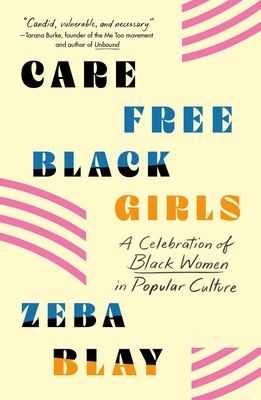CAREFREE BLACK GIRLS is a collection of essays written about the interaction of Blackness and pop-culture. The focus is more on the former than the latter, which seems to have disappointed some reviewers, but if you enjoy think-piece type takes on pop-culture, in the style of authors like Rebecca Solnit or Lauren Michele Jackson, you'll probably really enjoy this. I recently got into an argument with someone over the validity of soft journalism like this, where the point isn't necessarily to share factual, testable data, but cultural opinion. With social phenomena, there often isn't measurable data, so if you want to describe what you see in the world, your samples come from observation and consensus opinion. But how else are you supposed to write about and study culture?
While reading, I waffled between four and five stars. Most of the essays in this book were incredibly strong. I liked the one about how people talk about plus-sized bodies (using Lizzo as an example). I liked the essay about the meme-ification of Breonna Taylor, which tied into performative activism and the commodification of Black bodies for clout. I liked the essay about colorism and how Hollywood still favors lighter skinned actresses. And I LOVED the essay about Mel B and her role in the Spice Girls, which then segued into how Black representation in film and media has changed from tokenism to more authentic roles.
CAREFREE BLACK GIRLS is one of those books that everyone should read but I do have a few criticisms. I didn't really care for the essay about Cardi B and Nicki Minaj's feud. I guess from a "tea" standpoint, it's sort of interesting to hear about a tiff between two famous women, but I'm not really invested in either of them as performers, and apart from some valid criticisms of people who infantilize and marginalize Cardi, denying her Blackness and her potential for growth because of her upbringing, it felt more disorganized and less cohesive than Blay's other essays.
I also thought it was a little strange how the author seemed to suggest that Aunt Viv's character was replaced on Fresh Prince because of colorism because, from what I understand, Janet Louise Hubert was replaced because of an ongoing feud she had with Will Smith behind the scenes. If she was going to use this as an example, it felt like it might have been better placed in her essay about Denise Huxtable, played by Lisa Bonet, who had a similar tension with Bill Cosby, because both Cosby and Smith seemed to resent sharing the spotlight with their incredibly charismatic female co-stars.
Lastly, the author said at the beginning that she wasn't going to define things for readers because she felt like they should do the legwork, and I think that is mostly fair, but then she uses a couple terms that have some nuance when it comes to definition (like hotep, for example), where even after looking it up, I wasn't 100% sure what she meant, or what her particular definition for the term was. I also was unclear if the photos she used at the beginning of each essay were supposed to tie into the essays because sometimes the relationship was unclear (why was Mae Jemison shown before the Cardi B/Nicki Minaj Chapter????).
But overall, this is a really great collection. I liked what Blay had to say and how she wove some of her own personal experiences into these observations. When you look up her Goodreads bio, she has a truly impressive resume, and it's easy to see while reading these essays why she was published in such a wide variety of prestigious media outlets. Anyone who is interested in the development of pop-culture and how it intersects with gender and ethnicity, needs to read this book.
4 to 4.5 out of 5 stars

No comments:
Post a Comment
Note: Only a member of this blog may post a comment.